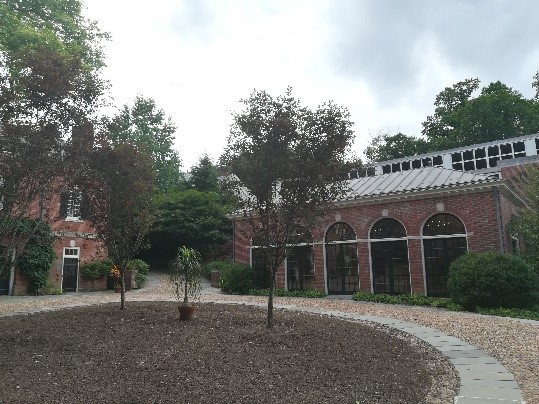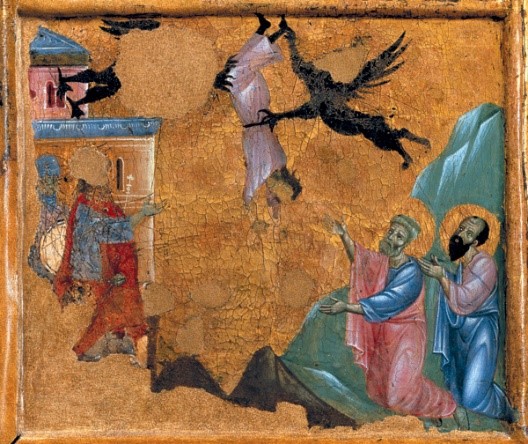Blog: On academic mobility and the virtues of uncertainty (bis)
-- This blog post was written by Dr. Julie Van Pelt, postdoctoral researcher in the Novel Saints research group.
In the past few days, I have barely left my house. This is not due to the national lockdown (which is obviously also a source of reduced activity, but not the reason for my self-imposed quarantine): it is because I am afraid to miss a delivery. I find myself in a constant state of readiness to run downstairs in case the doorbell rings, now and then casting nervous glances out onto the street. Yes, I am expecting special mail: a ridiculously important piece of paper called ‘DS-2019’. It is the key to my planned research stay in the United States during 2021, and the first step in the process of applying for a Visa. Normally, getting the document is the easy part. But nothing is easy these days—and don’t get me started on ‘normal’.
 I went through the process of applying for a Visa with the US embassy in Brussels before, in 2019. The whole experience was frustratingly complex even then. To make matters worse, on the very day of my appointment at the embassy, a fire had broken out in a tunnel close to Brussels Central, interrupting all train traffic. But a few detours could not keep me from my goal. I eventually managed to make all necessary preparations and left for a two-month research stay in Washington DC, which turned out to be one of the best academic experiences of my career so far. (See image to the right: the library of Dumbarton Oaks in Washington DC, currently closed due to Covid - picture taken in 2019.) The plan was to go back for further research and, this time, the envisaged stay is twelve months. However, this time, what stands in between me and my research plans is not a fire, but a virus.
I went through the process of applying for a Visa with the US embassy in Brussels before, in 2019. The whole experience was frustratingly complex even then. To make matters worse, on the very day of my appointment at the embassy, a fire had broken out in a tunnel close to Brussels Central, interrupting all train traffic. But a few detours could not keep me from my goal. I eventually managed to make all necessary preparations and left for a two-month research stay in Washington DC, which turned out to be one of the best academic experiences of my career so far. (See image to the right: the library of Dumbarton Oaks in Washington DC, currently closed due to Covid - picture taken in 2019.) The plan was to go back for further research and, this time, the envisaged stay is twelve months. However, this time, what stands in between me and my research plans is not a fire, but a virus.
Covid-19 has impacted all of our lives drastically, whether it is by changing the conditions in which we work (or are unable to work), by isolating us from friends and family or, worse, by impairing our health or that of those we love. A less visible but equally strenuous problem is that our lives are currently controlled by uncertainty. In my case, a fairly big event (moving abroad for a year) has been on hold so far, and it is unclear whether it’ll happen in January, later in the year, or not at all. Yet, this uncertainty is experienced by all of us to a certain extent. As my colleague Ellen Söderblom Saarela put it in her blog post last June: “Collectively, we’re living in a state of uncertainty.” Six months and another lockdown later, this hasn’t changed. The inability to plan ahead, whether it concerns matters small or large, is disorienting. Uncertainty forces us to reinvent our daily habits as well as our default mental patterns for dealing with life’s events. When it comes to my own plans, I might be at the point where I’m hoping for a miracle, some sort of magical solution.
Not your everyday miracle
In fact, miracles—stories about miracles, to be precise—are what I am going to study during my time in the US. But these miracles are different from the proverbial one I just told you I’m hoping for. In the ancient and late antique world, miracles were potentially everywhere and they were potent signs and vehicles of meaning. During the first centuries CE, Christianity indeed relied on the belief in miracles to expand its influence throughout the Roman empire. Rather than being incredulous towards the inexplicable, early Christians would embrace wondrous events precisely as indices of truth which induced faith. The deeds of Jesus and the apostles were interpreted as meaningful signs pointing to the one true course of life—and death. Stories were a crucial part of that process of interpretation.
Miracles have to do with uncertainty too. In the volatile world of the early Christian era, uncertainty was a huge part of life. Apart from the constant threat of war and disease, society faced great political instability, and it was not able to rely on advanced technologies to predict the immediate future. This meant that people had to be well equipped mentally to deal with the instable reality within which they were living their lives. There were many ways in which ancient societies regulated the ability of individuals to construct a meaningful whole out of the chaos. Christianity offered an antidote to the uncertainties of life in the form of a firm promise about a certain afterlife. Miraculous thinking was another way of handling these challenges. As a form of interpretation of what are, in essence, unexplained and ostensibly irrational events, the idea of the miraculous imposes order on a chaotic world; it provides meaning to what seems inexplicable. In this context, a miracle is not an unexpected solution to a seemingly unsolvable problem, but a steady guide in an unstable environment.
Magic and ambiguity
 Yet, the meaning of miracles was not always straightforward. Since they are the product of an act of interpretation, they are open to different forms of understanding and (in the eyes of some) misunderstanding. Jesus and the apostles were frequently charged with accusations of magic by opponents of the new religion. This was an effective strategy to discredit them as well as the power they were perceived to be invested with, and therefore discredit the entire religion they sought to promote. For magic had sinister connotations: in the eyes of the broad public, it was typically practiced by outsiders and charlatans.[1] Hence, the same unexplained events which offered a steady guide towards meaningful truth for some, would be interpreted as manifestations of deviance for others. While today, magic and miracle are seen as closely related, in the ancient world, they were each other’s opposites, one driven by a beneficial divine power, the other by evil demonic forces. Yet what made things particularly tricky was their superficial resemblance. In the apocryphal Acts of Peter (2nd cent. CE), the apostle is made to duel the evil magician Simon in a supernatural powers-contest taking on blockbuster proportions. Based on their performances, the Roman public must decide who is truly from God and who is the impostor, since both claim the status of divine agent.[2] (See image right: Simon Magus flies through the air above Rome with the help of demons.)
Yet, the meaning of miracles was not always straightforward. Since they are the product of an act of interpretation, they are open to different forms of understanding and (in the eyes of some) misunderstanding. Jesus and the apostles were frequently charged with accusations of magic by opponents of the new religion. This was an effective strategy to discredit them as well as the power they were perceived to be invested with, and therefore discredit the entire religion they sought to promote. For magic had sinister connotations: in the eyes of the broad public, it was typically practiced by outsiders and charlatans.[1] Hence, the same unexplained events which offered a steady guide towards meaningful truth for some, would be interpreted as manifestations of deviance for others. While today, magic and miracle are seen as closely related, in the ancient world, they were each other’s opposites, one driven by a beneficial divine power, the other by evil demonic forces. Yet what made things particularly tricky was their superficial resemblance. In the apocryphal Acts of Peter (2nd cent. CE), the apostle is made to duel the evil magician Simon in a supernatural powers-contest taking on blockbuster proportions. Based on their performances, the Roman public must decide who is truly from God and who is the impostor, since both claim the status of divine agent.[2] (See image right: Simon Magus flies through the air above Rome with the help of demons.)
Eventually, then, even miracles were not a watertight answer to the uncertainties of life. As a system of interpretation, they were in competition with other systems. While this does not necessarily detract from their potency, it does offer us a powerful idea of the profound ambiguity of the physical reality surrounding us. This ambiguity, which makes miracles vulnerable to the discrediting charges of magic, is what humans are faced with constantly and must try to interpret meaningfully.
Doubt in the internet age
The ambiguities and uncertainties of life have not necessarily disappeared in the modern day. Yes, we generally know with relative accuracy what the weather is going to be like tomorrow and we can similarly find out about almost any other fact with great ease. Yet the idea that we live in an age of certainty is, to some extent, an illusion. For instance, the internet has such an abundance of information to offer that one can easily lose their way in it. At the same time, according to one documentary, social media are currently designed to reinforce the patterns of thinking with which you came to these platforms in the first place rather than to offer you a wide range of options or ideas. So even if we can technically know about almost anything, what do we believe and why? What has become shrouded by the false impression of certainty, in my view, is that data and knowledge about the world, no matter how extensive and detailed, still demand interpretation, just as any other experience. As in the ancient world, this often requires some sort of set of ideas that is not purely rational, but cultural, open to change, and not necessarily shared by all. Hence, the idea that ‘big narratives’ govern societies, which we usually find in the context of the pre-modern world, may still be valid (in fact, astrology, one of the most ancient methods for interpreting life itself, has gained tremendous popularity in the last decade). Only, today, these ‘narratives’ might be somewhat less visible. (See image on the right: The Cathedral of Saint Peter in Exeter. Monumental churches around the world make the big narrative of Christianity highly visible.)
 As my research about ambiguity in the ancient world got me thinking about uncertainty today, it inevitably made me reflect on the uncertainty I am personally facing with regard to my academic adventures abroad. It is undeniable that the pandemic has brought more uncertainty into my life than before. Nonetheless, another way to think about this is that the current crisis did not necessarily create new challenges but made the existing ones rise to the surface, rendering them more acute. Perhaps the uncertainty was always there, but I failed to notice it because I was too busy making plans, by-passing uncertainty before it could even manifest itself. In other words, there is an opportunity here to think about how we go about our lives. (Or, to use Ellen’s words again, “uncertainty carries an inherent potential”—coming at this from my own academic corner, I can only agree.) What does it mean to go abroad for research, for instance? And what does that contribute to my personal narrative; how is it meaningful? If anything, the crisis has taught me to be more self-aware about my choices, as well as about the fact that not everything is under my control. What I can control, is the way in which I understand and interpret the uncertainty and ambiguity I find all around me.
As my research about ambiguity in the ancient world got me thinking about uncertainty today, it inevitably made me reflect on the uncertainty I am personally facing with regard to my academic adventures abroad. It is undeniable that the pandemic has brought more uncertainty into my life than before. Nonetheless, another way to think about this is that the current crisis did not necessarily create new challenges but made the existing ones rise to the surface, rendering them more acute. Perhaps the uncertainty was always there, but I failed to notice it because I was too busy making plans, by-passing uncertainty before it could even manifest itself. In other words, there is an opportunity here to think about how we go about our lives. (Or, to use Ellen’s words again, “uncertainty carries an inherent potential”—coming at this from my own academic corner, I can only agree.) What does it mean to go abroad for research, for instance? And what does that contribute to my personal narrative; how is it meaningful? If anything, the crisis has taught me to be more self-aware about my choices, as well as about the fact that not everything is under my control. What I can control, is the way in which I understand and interpret the uncertainty and ambiguity I find all around me.
[1] For more, I refer the reader to D.J. Collins (ed.), The Sacred and the Sinister. Studies in Medieval Religion and Magic (Pennsylvania, 2019).
[2] The Acts of Peter has been edited and translated into German by M. Döhler, Acta Petri. Tekst, Übersetzung und Kommentar zu den Actus Vercellenses (Berlin/Boston, 2018).